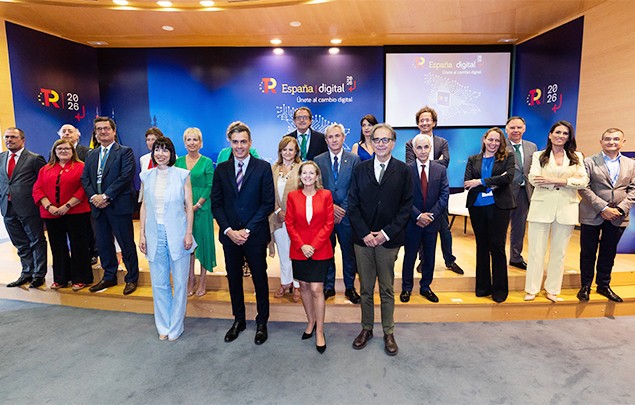GMV, an example of innovation

On July 8, the Digital Spain 2026 meeting took place in Madrid, bringing together the public and private sectors to discuss the main initiatives set up under this plan. GMV’s president, Mónica Martínez, attended the meeting and participated in the round table on R&D.
Digitalization, reindustrialization, and science are the three dimensions being emphasized in the Digital Spain Agenda, a program launched in July 2020 to promote the country’s digital transformation as a driver of modernization and a strategic pillar for recovery from the pandemic.
The First Vice-President of the Government of Spain and Minister for Economic Affairs and Digital Transformation, Nadia Calviño, opened the meeting with a speech that focused on digitalization as a key lever for modernizing Spain. She pointed out that Digital Spain 2026 is the digital arm of the Recovery, Transformation and Resilience Plan, the name given to the Spanish strategy for coordinating and managing European funds to repair the damage caused by the COVID-19 crisis.
Throughout the event, a number of outstanding projects already working to transform Spain’s economic model were highlighted by the top-level panelists taking part in the various round tables discussions. On behalf of GMV, President Mónica Martínez took part in the discussion titled “Championing R&D,” which was moderated by the Secretary-General for Innovation of the Spanish Ministry of Science and Innovation, Teresa Riesgo. Also taking part was the director general of the CDTI, Javier Ponce; the president of Gate2Brain, Meritxell Teixido; the president of Empresarios Agrupados, Javier Perea; and the director of the Textile Industry Research Association, Vicente Blanes.
In her remarks, Martínez highlighted GMV’s early days in the space industry, as a business with a high potential for innovation and one of the first to go digital. This has allowed the company to lead many digital transformation projects, such as Tartaglia, a project within the framework of the R&D Missions in Artificial Intelligence program of the Digital Spain Agenda 2025 and the National Artificial Intelligence Strategy, through which a federated network will be created to accelerate the application of artificial intelligence in healthcare systems and research into Alzheimer’s, prostate cancer, diabetes, and other diseases; and the CUCO project, which aims to advance the state of the art of quantum algorithms and apply this knowledge to unsolved problems in different strategic sectors of the Spanish economy.
Martínez also underlined the importance of the funds to help drive rapid recovery in the automotive industry by strengthening innovative capabilities through key technologies for self-driving and connected vehicles. This is the case of the R3CAV project (Robust, Reliable and Resilient Connected and Automated Vehicle for people transport), which is framed within the 2021 Sustainable Automotive Technology Program. Through this project, a consortium of Spanish companies led by the Renault Group and including GMV is taking on the challenge of developing a new prototype with Level 4 automation, leveraging 5G technology to connect the vehicle to its environment. This project will further develop and advance fundamental technologies for self-driving vehicles.
The event was also attended by Margrethe Vestager, Executive Vice-President of the European Commission; Reyes Maroto, Spanish Minister for Industry, Trade and Tourism; Joan Subirats, Spanish Minister for Universities; Diana Morant, Spanish Minister for Science and Innovation; Raúl Blanco, Spanish Secretary General for Industry and Small and Medium-sized Enterprises; and Carme Artigas, Spanish Secretary of State for Digitalization and Artificial Intelligence.
The president of the Spanish government, Pedro Sánchez, delivered the closing address, during which he highlighted the source of opportunities offered by digitalization and the importance of frameworks such as the Digital Spain program in modernizing the economy, regenerating the productive fabric, and achieving greater social cohesion.
More on the Recovery, Transformation and Resilience Plan
This recovery plan has defined Strategic Projects for Economic Recovery and Transformation (PERTE), in which government agencies, industry partners, and research centers work together to drive major initiatives that clearly boost the Spanish economy’s transformation. There are currently eleven strategic projects underway in areas such as electric and connected vehicle development, the aerospace industry, the naval industry, renewable energies, cutting-edge healthcare, the agri-food sector, the new language economy, the circular economy model, the digitalization of the water cycle, microchips, and the social and care economy.